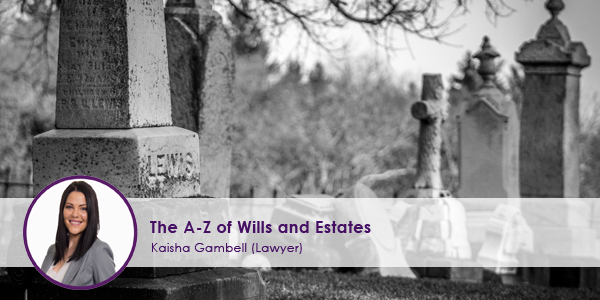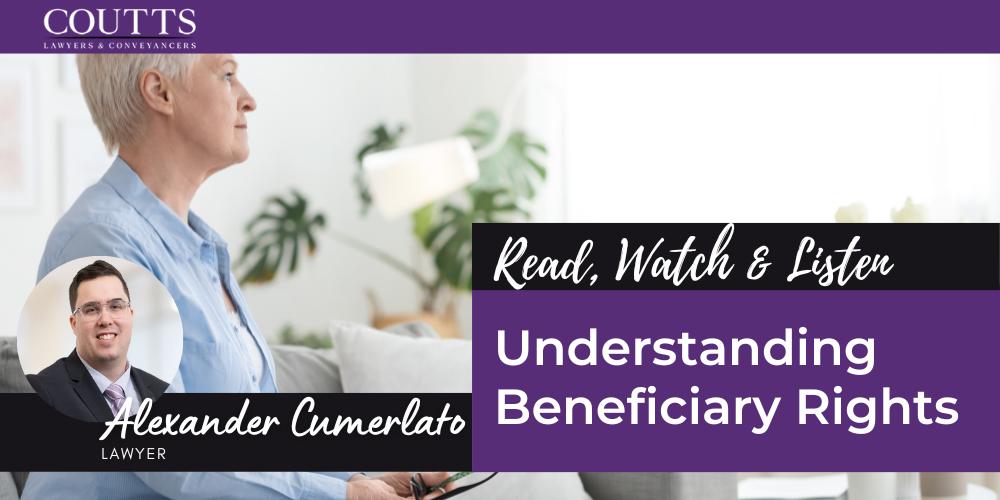Whether you are preparing a new will, or you are the executor for someone’s estate, the area of Wills and Estate Law can sometimes be a little overwhelming and confusing, and the ancient terminology that we use doesn’t make it any easier.
Historians have evidence that the area of estate planning dates back as early as Ancient Egypt some thirty years before Christ, whilst the modern day will as we know it now had its history in Roman Law[1]. It is because of this rich history that many of the legal words and terminology that we still use in Wills and Estates today are Latin legal terms and can be just as difficult to pronounce as they are to understand!
We’ve created ‘The A to Z of Wills and Estates’ to give you the information you need to make sense of what your lawyer, judge or favourite law TV show are saying!
A is for…
Ademption – where a specific gift of property made to someone under their will fails because the property is no longer owned by the will-maker at the time of their death.
Administrator–the person who is appointed by the Court to manage the deceased estate of a person who passed away without a valid will.
Advanced Health Care Directive – a written document which records your values, beliefs and wishes in relation to the healthcare treatments you would like to receive or refuse in the event that you are seriously ill and unable to make those decisions for yourself.
Affidavit – a written statement that is sworn to be true by the person who signs it.
Asset – something that is owned by the deceased person such as land, a bank account or a motor vehicle.
Attorney – the person appointed to make legal, financial and property related decisions on your behalf under a Power of Attorney document.
B is for…
Beneficiary–the person or group of people who benefit from the will or estate of a deceased person.
Bequeath – to leave a gift of personal property to someone in a will.
Binding Death Benefit Nomination – a written direction to the trustee of your superannuation fund that nominates the person or persons who you wish to receive your superannuation death benefit once you have passed away.
C is for…
Codicil – a written document that modifies, changes or revokes parts of an earlier will.
D is for…
De Facto Relationship – a relationship between two people as a couple who were living together, but who were not married to one another.
Deed of Family Arrangement – a written agreement to record the distribution of a deceased estate where the distribution is not made in accordance with the will of the deceased person, usually where the beneficiaries wish to rearrange the distribution of the estate between themselves or to settle a claim against the estate outside of the Court.
Dependant – someone who depends on someone else for financial support. For superannuation purposes, this can be a spouse or a child.
E is for…
Enduring Guardian – the person appointed to make health, lifestyle and medical decisions on your behalf when you are no longer capable of making these decisions for yourself.
Estate – all the property owned by a person at the time of their death.
Executor/Executrix – a man or woman appointed by the will of a deceased person to administer the estate in accordance with the wishes of the will.
F is for…
Family Provision Claim – an application to the Supreme Court of New South Wales by a person who has been left out of a will seeking provision from the estate of the deceased person, i.e. the application to challenge the will of a deceased person.
G is for…
Grant – a formal document issued by the Supreme Court of New South Wales which gives the Executor or Administrator the authority to deal with the assets of the estate.
Guardian of Minors – the person appointed in your will to look after the interests of your minor children after you have passed away.
H is for…
Heir – a person who is legally entitled to the property of a deceased person, more commonly known as a beneficiary.
I is for…
Intestacy – when someone passes away without a valid will, they have died “intestate” and the assets of their estate will be divided amongst their relatives in accordance with the law.
J is for…
Joint Tenants – a form of property ownership between two or more people who share equal ownership and equal rights to the property.
K is for…
Kin – a person’s family and relations are that person’s next of kin.
L is for…
Legacy – a gift of personal property or money given to a beneficiary in a will.
Letters of Administration – the formal grant from the Supreme Court of New South Wales giving the administrator the authority to deal with the estate assets.
Liability – the debts that a deceased person owes at the time of their death.
Life Estate – the ownership of land for the duration of a person’s life, which may pass back to the original owner or another person upon their death.
M is for…
Maintenance – early distribution of the estate for a person’s maintenance to a beneficiary who was wholly dependent upon the deceased person and is entitled to all or part of the estate.
Mediation – an informal process for helping people who have a dispute to resolve the dispute without going to Court.
Minor – a child who has not yet reached the legal age of 18 years.
N is for…
Notice of Death – the document required to transfer property owned as joint tenants into the sole name of the surviving owner.
O is for…
Offer of Compromise – a written offer made from one party to another party stating the terms on which they would be prepared to settle the dispute between them without going to Court.
P is for…
Personal Property – the property of a deceased person except for land.
Per Stirpes – describes the process of distributing the estate of a deceased person equally between the children of the beneficiary who was entitled to a share of the estate. For example, where a parent is the beneficiary of a will but passes away, their share of the estate will go to their children instead.
Power of Attorney–a written document which gives another person the authority to make legal, financial and property related decisions on your behalf.
Probate – the formal grant from the Supreme Court of New South Wales giving the executor the authority to deal with the estate assets.
Q is for…
Qualified Witness – the persons who are authorised to witness a person sign a Power of Attorney or Enduring Guardian, being a lawyer, a registrar of the local court or an employee of the NSW Trustee and Guardian.
R is for…
Real Property – land that is owned by the deceased person.
Renouncing Probate – where an executor appointed by a person’s will does not wish to accept their appointment as the executor.
Residue – the balance of the estate assets after all of the debts, taxes, funeral expenses and specific gifts have been paid.
S is for…
Succession Act – the Succession Act 2006 (NSW) is one of the key pieces of law which governs the area of Wills and Estates.
T is for…
Testamentary Trust – a type of trust that you can create in your will for certain beneficiaries of your estate which will not come into effect until after you have passed away.
Testator– a person who makes a will.
Trustee – the person who holds property for the benefit of the beneficiaries.
U is for…
Undue Influence – where a will can be deemed invalid because the will maker was coerced or influenced by another person to include something in their will that is against their true wishes.
V is for…
Valid Will – a will voluntarily made by a person who is over the age of 18 years, which has been signed and dated by the will maker in the presence of two witnesses.
W is for…
Will – a legal document used to record your wishes in relation to who receives your assets after you pass away.
Witness – the person who watches the will maker sign their will and then also signs the will to verify the authenticity of the signature.
X is for…
TestatriX– a female person who makes a will.
Y is for…
Yacht – a luxury asset that will form part of the deceased person’s personal property if they were so lucky to own one at the time of their death.
Z is for…
Zero Control – which is what you will have if you do not prepare your Will, Power of Attorney or Enduring Guardian in accordance with your wishes whilst you are still alive and have the mental capacity to do so.
[1] William D Rollison, History of Estate Planning, 37 Notre Dame L. Rev. 160 (1961).
Need to get your will organised? Talk to the team at Coutts Lawyers & Conveyancers today.
For further information contact:
Kaisha Gambell
Lawyer
kaisha@couttslegal.com.au
02 4647 7447



